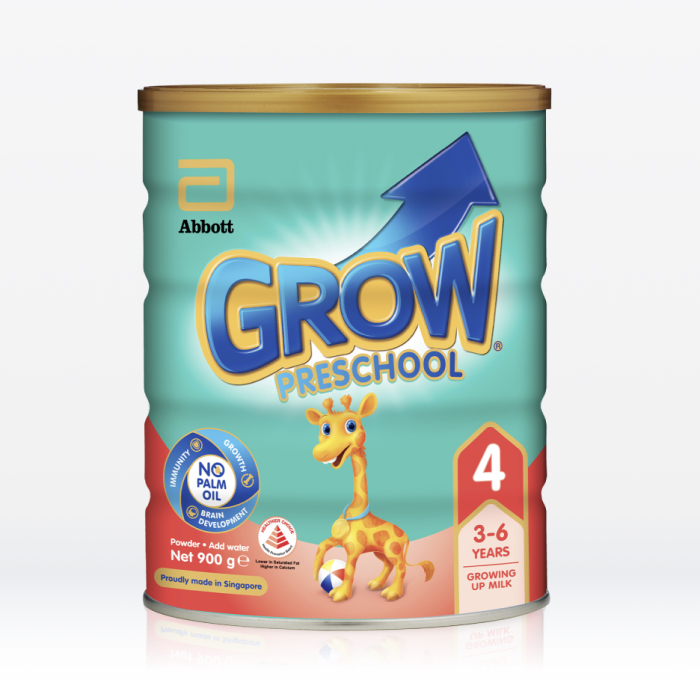Grow® Preschool Stage 4
- Main Image
-

- Subtitle
- 3 years onwards
- Title
- GROW® Preschool Stage 4
- Detail Page Path
Balanced bilinguals, those who are equally strong in two languages, tend to do better in IQ tests because they are thought to benefit from having their minds expanded, through forming more neural connections, early in life. The advantage of learning more than one language as an infant is the number of connections in the brain that are formed.
The best motivation for learning a language is necessity: for example, the desire to make needs known at home, to fit in at school or to play with friends. To increase this motivation, we need to make the second language as important as the first for daily living.
From six months in the womb, the foetus begins to group together the phonemes, or speech sounds, it hears in its mother’s speech.
After birth, the crucial time for developing strong language is in the first year because babies process language structure and meaning long before they begin to speak. Parents can support children’s early language learning by responding to their coos and babbles with speech sounds and words. By the time babies begin to put words together they have already learned the peculiarities of languages around them.
Children who are exposed to two languages from birth learn to speak both fluently. From six months, however, if babies have not heard particular sounds from individual languages, they will experience difficulty distinguishing them later.
When the first birthday comes around, children can no longer process speech sounds they have not heard, having learnt to ignore phonemic distinctions not necessary for their native languages. In fact, a baby’s babbling from seven months on is confined to sounds he has already heard at home.
As time goes on, adaptability decreases. After six or seven years old, the window of opportunity for forming strong language connections is largely closed.
Children who are engaged regularly in early language and conversation will start, from around two years old, to outshine those who are not. Differences in ability and achievement can remain evident through school, probably because sensitive child-focused communication strengthens cognitive development and supports development of positive self-esteem.
Don’t worry about them being confused: recent research at Antwerp University shows that two and three year-olds are able to understand that they are using two distinct languages when they do so. It is totally natural for them to absorb the languages they hear daily because they want to communicate with those they love, their family members and teachers.
Children need exposure and opportunity to practise to become effective in a language. Your child can learn to pick up phrases, words and even sentence structures from your conversations over time and become more accustomed to the language. The key to making it easy is consistency.
Parents often ask whether or not their child can become bilingual through the language programmes in their preschool. The simple answer: you need to spend more time immersed in the language, beyond those set school hours.
If the child is exposed to 5 – 10 hours of a second language during a school week, but is immersed only in English outside this, he will be more confident speaking English.
To improve their speaking ability, make the habit of conversing in the more than one language at home. The rule is to associate one person to one language. Mummy always speaks Malay, while Daddy speaks only in Mandarin. When both parents are together, they speak in one, common language.
Tough parenting doesn’t always succeed. Even Amy Chua, author of “The Battle Hymn of the Tiger Mother” admits that nothing is more important than the family bonds we form with our children.
Forcing languages on unwilling children will only damage our most important relationships with them. If a child feels like a failure, there will be signs of resistance to learning.
When children are excited, happy and engaged, they learn most easily. Children learn to speak and read characters and words through enjoyable activities and games in a form that holds attention. Let them learn through play, without realising that they are learning. Create exciting opportunities to use language, like sharing books, stories, songs, games, cooking, music, to keep confidence high.
Do remember that young children have short attention spans. Unless really interested in an activity, an average of five minutes for two to three year-olds, extending to 10 minutes for three to four year-olds, is a long time to focus attention. Therefore you should give your children breaks from language tutoring, so that language development does not become tedious. Interested children learn associatively and sub-consciously, without realising that they’re learning.

You want to nourish your child with a nutritious diet, so what are the healthy drinks for kids? Most kids sure love sweetened beverages.

A Good milk formula contains no palm oil! What savvy parents need to know about fat blends in milk powders.

Children communication is complex process involving skills such as listening, speaking, reading, writing and body language.

How to make learning for kids fun to nurture your child's curiosity and help cultivate the interest in learning. Come out, let's get learning!

Choose a formula with no palm olein for with better absorption of key nutrients such as DHA, AA and calcium.
You are about to exit for another Abbott country or region specific website.
Please be aware that the website you have requested is intended for the residents of a particular country or region, as noted on that site. As a result, the site may contain information on pharmaceuticals, medical devices and other products or uses of those products that are not approved in other countries or regions.
The website you have requested also may not be optimized for your specific screen size.
Do you wish to continue and exit this website?